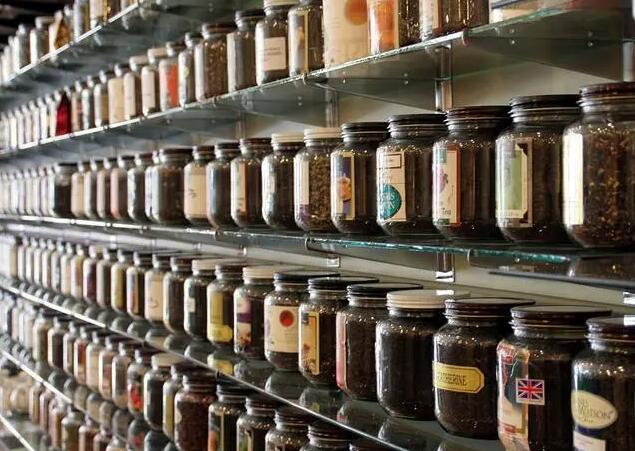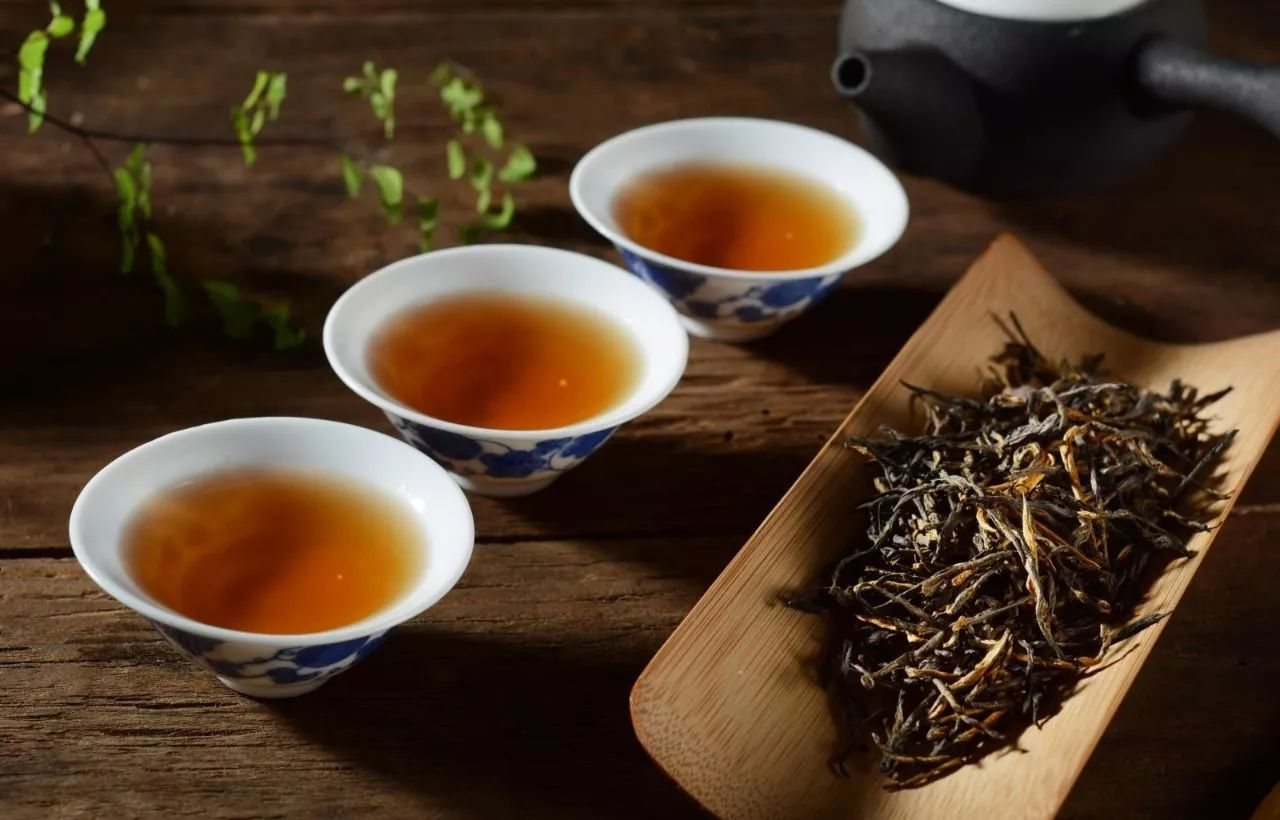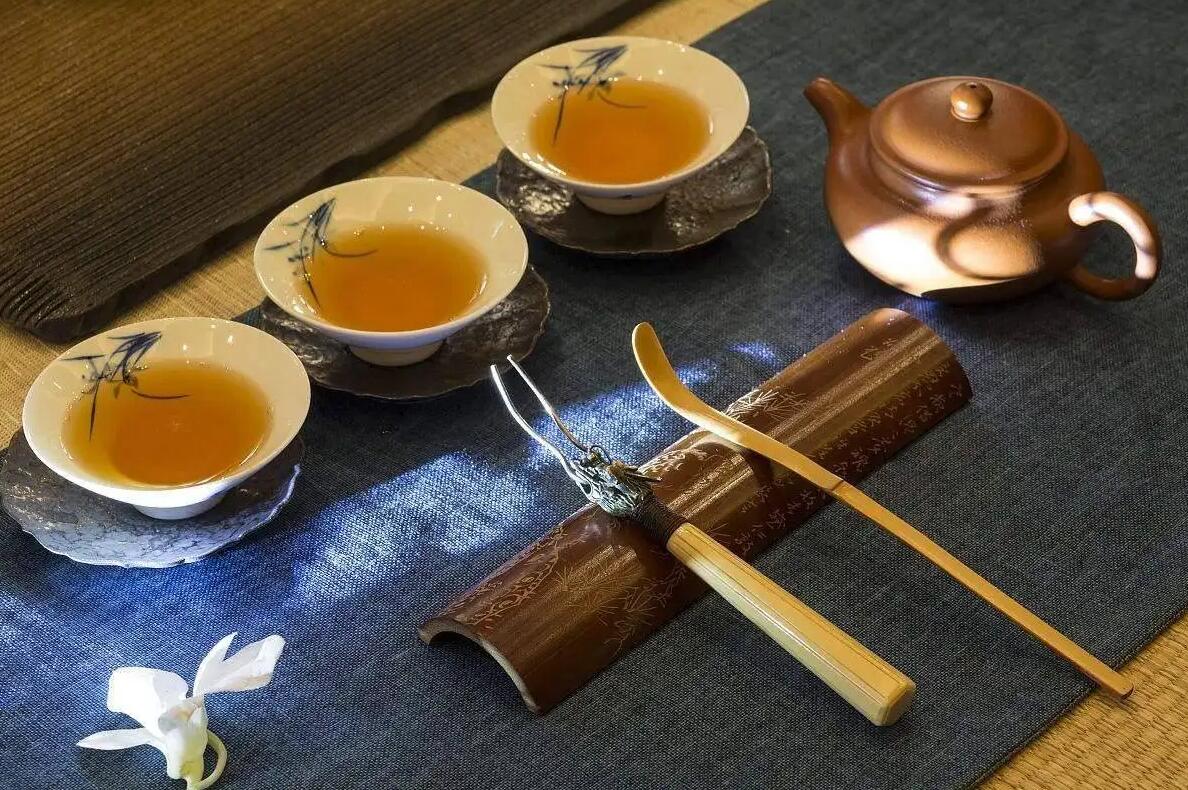Liulichang is a famous street of antiques and culture. In the middle of the 1990s Feng Jianhua opened on this street a teahouse with the purpose to promote Beijing traditional art and culture. Lao She's wife wrote the name of it: "Jingwei Teahouse", meaning "A Teahouse of Beijing Taste".
Jingwei Teahouse was originally in the compound of the China Bookstore. Its nature was much similar to that of Lao She Teahouse. But its decoration was much simpler. The gale, windows, counters, tables and chairs were not elaborately painted The paintings and calligraphic inscriptions on the walls and Chinese tea sets were ordinary. But their blended effect showed strong local tastes of Beijing. The atmosphere made customers fed they had gone back to old days.
The teahouse's principle was to "serve good tea at low price". Old people could bring their own tea leaves and stay in it to while away their idle time. The teahouse charged them only for the hot water. In the afternoon the teahouse arranged shows of story telling and other vocal forms of folk art. The charge was only several yuan. Men of letters liked to come to this teahouse after they had browsed the bookstore and antique shops on Liulichang Street. They felt much relaxed after they had enjoyed a cup of tea or a few plots of the story.
A couplet on the gate had these words: "The Rose Dews" tea is matchless in the world; The plum juice is the best under heaven." These words were often seen outside teahouses in old Beijing. There were also notices on red paper with the words: "Fresh iced plum juice and other kinds of fruit juice", "Three yuan for the story telling", "Welcome artists to perform in the teahouse" and "Embroidered table aprons are on sale". The furniture was of old style too: a high counter, narrow shelves, blue-and-white porcelain tea jars, black-lacquered square tables, long benches, tea cups with lids and small fruit saucers, The customers could spend an entire afternoon over a cup of tea while listening to cross-talk.
The teahouse served peanuts, watermelon seeds, cookies and plum juice to go with the tea. The fare for a cup of tea was several yuan. The drinker could ask for refilling of hot water. Iced plum juice tastes much better. It can help relieve the summer heat and quench the thirst.
Feng Jianhua, the owner of the teahouse, big and fat, is a famous specialist of Beijing folklore. He finished the college course of Chinese language by self study and for a period did in-depth research on the history of Chinese folklore. He is now a guest professor of the Archives Institute of Remin University. When he enters the classroom he nods his head as a way of greeting and conducts his lecture in concise words. The pair of glasses with broad black rims he sports gives him a calm expression.
The waiters and waitress were the busiest in the teahouse. They brewed the plum juice, heated water, delivered tea, refilled hot water and did the cleaning. They wore Chinese traditional shirts with a towel over their shoulders, looking bright and quick witted.
Story-telling is the essential feature of Beijing-style teahouses. From Monday to Friday stories were told in the teahouse and in the afternoon on Saturday and Sunday there were crosstalk shows. Several comedians came to perform. It was the busiest time of the teahouse.
The weekend was a time for vocal entertainers to get together to talk about their trade. They also presented their new creations on stage. Traditional forms of vocal art are an important part of Beijing folklore. The Beijing-style teahouses have made a great contribution to their existence.
Those who felt tired after they had browsed Liulichang Street and came into the teahouse just for a rest or tea to quench their thirst or just for getting out of the hot sun or rain could not get a real feeling of Beijing traditional way of tea drinking.
Many of the regular customers of this teahouse were nearby residents. They often stayed there for half a day. They came not only to listen to the story teller but mainly for whiling away their time. Some of them made a living by renting their houses. They had nothing much to do so they came to the teahouse to drink tea, ate roasted melon seeds and chit chatted with acquaintances. They might even take a nap there. Some people came to the teahouse to meet friends or play chess.
It is a pity that the Jingwei Teahouse closed in 2000. Its former owner Feng Jianhua is carrying on his study on folklore in 6ther ways. Later he reestablished the Jingwei Teahouse in Beidaihe, a seaside summer resort. Fortunately the Tianqiao Amusement Tea Garden in the Tianqiao area still exists.
The Tianqiao area in old times had many entertainment establishments, restaurants and stores. If someone wants to know what the old-time Tianqiao was like he can experience it in the Tianqiao Amusement Tea Garden located on Beiwei Road in Xuanwu District. The site was originally the Tianle Theater built in 1933. It was renovated in 1992 and opened to the public again. Visitors to the Tianqiao Amusement Tea Garden can experience various customs of old Beijing. The amusement ground reenacts the grand scenes of the "Tianqiao area filled with wine shop signboards and visitors who have forgotten to return home."
The Tianqiao Amusement Tea Garden has a total area of 1,300 square meters and can accommodate 180 people to watch stage performance, eat or appreciate tea at the same time. The elegant main hall on the first floor has 24 square or round tables and comfortable chairs. A theater in front of the main hall has old-style square tables and chairs of hard wood. Stores on either side of the theater sell Beijing-style snacks. Waitresses in mandarin gowns deliver tea. The customer has to pay in copper coins exchanged with circulating currency. There are nine boxes on the second floor. Peking Opera, acrobatics and other forms of performance are staged in this theater regularly. The customers feel they have returned to the old days in Beijing if there is no ringing of mobile phones.
As in old times, the ushers in the main hall pass the towels from one to another by throwing them through the air and the entertainers and waiters and waitresses are all dressed op in Chinese traditional clothes. The stage shows of operas, acrobastic, kung fu and vocal forms of folk art are marvelous. The atmosphere is typical to a teahouse in old Beijing.
The Tianqiao Amusement Tea Garden has received over 100,000 visitors from various parts of the world. After American President Nixon watched a show there he made this comment: The show was the best he had ever watched. The teahouse has received state heads from a dozen countries and more than 100 foreign diplomats.



